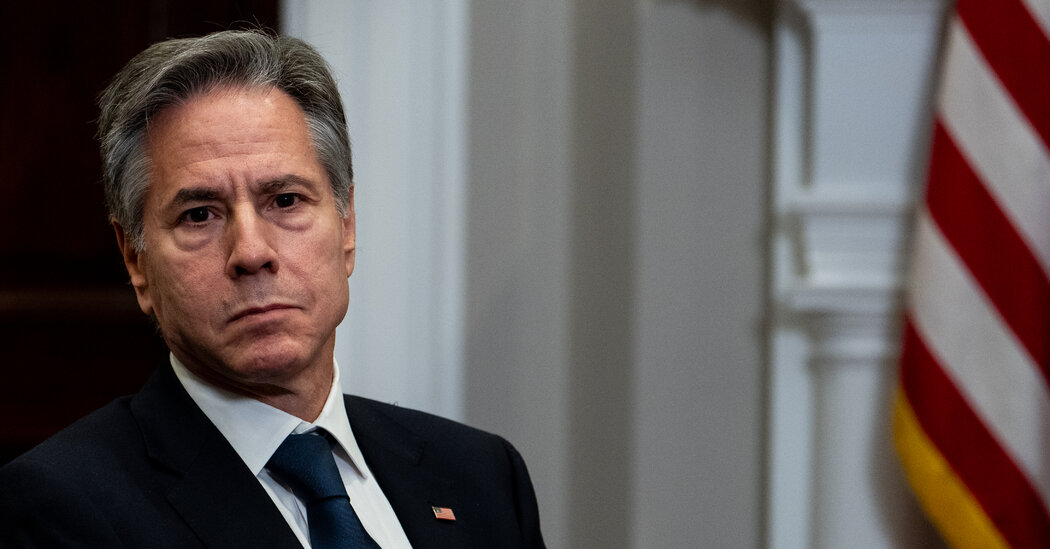
Secretary of State Antony J. Blinken arrived in Italy on Wednesday for a meeting of Group of 7 foreign ministers, where problems in the Middle East and the fate of Ukraine will be central topics.
The meeting will take place as world leaders try to contain the growing fallout from the war between Israel and Hamas. With the utmost urgency, they are trying to persuade Israel not to escalate the conflict with Iran in the wake of Iranian attacks on Israel over the weekend, which caused little damage but involved hundreds of missiles and drones and prompted Israel to call for a punitive response.
In the opening session, officials will also discuss Israel's invasion of Gaza and international efforts to reach a ceasefire agreement.
The G7 is a conference of seven industrialized democracies – Italy, Canada, France, Germany, Japan, Great Britain and the United States – as well as representatives of the European Union. The meeting, to be held on the Mediterranean island of Capri, is a prelude to the G7 leaders' summit scheduled for mid-June in Puglia, Italy.
The G7, which often issues joint proclamations on world events, issued a statement Sunday condemning “in the strongest terms Iran's direct and unprecedented attack on Israel.” The group also said it would work to “end the crisis in Gaza” through “an immediate and sustainable ceasefire and the release of hostages by Hamas” and increase the delivery of humanitarian aid to the Palestinian territory.
Talks to at least suspend the fighting in exchange for the release of hostages and further aid deliveries have stalled for weeks. US officials say Hamas has rejected credible Israeli offers and represents the main obstacle to resolving the conflict, even as international pressure grows on Israel over the civilian toll in Gaza.
An official agenda for this week's three-day event called for the group to discuss “pursuing a meaningful and effective political approach” toward the “'two peoples, two states' solution,” a reference to the goal of establishing a possible Palestinian alliance. State alongside Israel. The United States and several other nations have revived this long-standing goal in recent months, but Israeli leaders such as Prime Minister Benjamin Netanyahu reject it.
Another related session will focus on Iran-backed Houthi militants in Yemen, whose attacks on international shipping in the Red Sea have disrupted global trade and attracted dozens of U.S. airstrikes.
And on the theme that has dominated their last two meetings, G7 ministers will affirm their support for Ukraine's defense against Russia, amid strong concerns that a more than $60 billion aid package proposed by President Biden can overcome the opposition of a minority of countries. Republicans in the House. Western and Ukrainian officials warn that Ukraine is at risk of suffering substantial losses to Russia, and even defeat, without significant long-term support.
The European Union's top foreign policy official, Josep Borrell Fontelles, said in a statement that the group “will hold a discussion to ensure continued support for Ukraine,” which will include Ukrainian Foreign Minister Dmytro Kuleba and the Secretary General of NATO, Jens Stoltenberg.
Ministers are likely to discuss proposals to seize some or all of the $300 billion in Russian assets that Western banks have frozen since Russia invaded Ukraine in 2022. Western governments are divided over whether and justification legal for such a move, but they discussed compromises, including potentially seizing and sending to Kiev only the interest generated by those accounts since they were frozen.
In an interview with Reuters, Italian Foreign Minister Antonio Tajani, who hosted the meeting, said his country was not openly against the idea, but that a “study” was needed to find a “basis legal”.
Other sessions will focus on Africa, the Indo-Pacific and global issues such as climate change, artificial intelligence and cyber threats.
